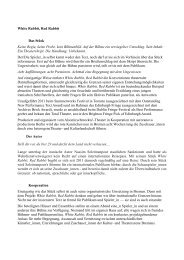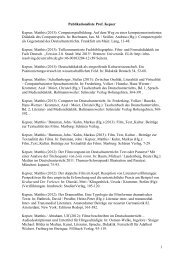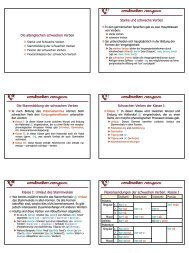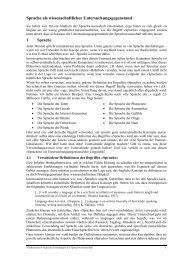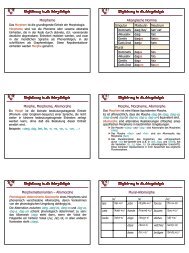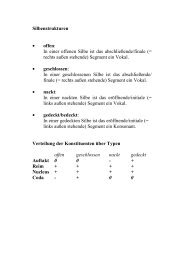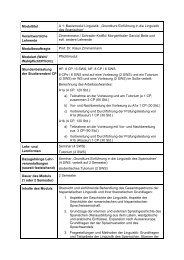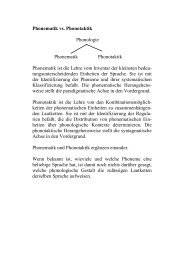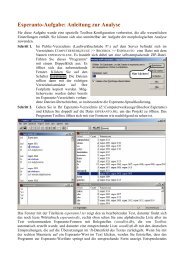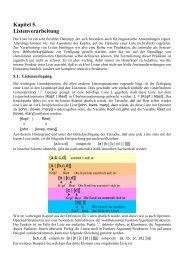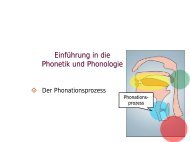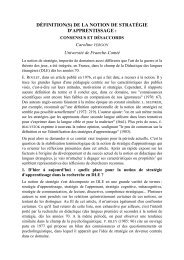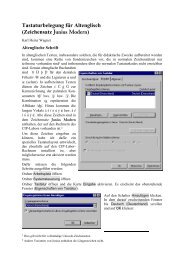Relativism and Universalism in Linguistics - Fachbereich 10 ...
Relativism and Universalism in Linguistics - Fachbereich 10 ...
Relativism and Universalism in Linguistics - Fachbereich 10 ...
You also want an ePaper? Increase the reach of your titles
YUMPU automatically turns print PDFs into web optimized ePapers that Google loves.
Workshop 1 – Abr 139<br />
3. Progressive ASP + deontic M:<br />
Kimi-wa [TP [MP1 [ASPP [soko-de mat]tei] (a)nakereba narana] i]<br />
you-TOP there-LOC wait-GER IPFDEO -NPST<br />
‘You must be wait<strong>in</strong>g there’ (unambiguously deontic)<br />
4. Progressive ASP + epistemic M:<br />
Kimi-wa [MP2 [TP [ASPP [ soko-de mat]te i] ru daroo]<br />
you-TOP there-LOC wait-GER IPF-NPST EPI<br />
‘You’ll probably be wait<strong>in</strong>g there’ (epistemic)<br />
Nevertheless, an effect of aspectuality on modality may be observed which might support the<br />
general status of the connection between (im)perfectivity <strong>and</strong> type of modality. Concretely, <strong>in</strong><br />
specific contexts, sentences with progressive ASP <strong>and</strong> deontic M can carry the implication of<br />
epistemicity. The possibility of an implicature here has already been po<strong>in</strong>ted out by some<br />
authors (Tamura 1999, Amamiya 2000). However, actual examples with epistemic read<strong>in</strong>gs <strong>in</strong><br />
empirical data are vanish<strong>in</strong>gly rare. Apparently, the conventionalization of this implicature is<br />
blocked by the rich extant system of epistemic modal mark<strong>in</strong>g.<br />
Modality, negation <strong>and</strong> aspect:<br />
the case of the Russian mozhet <strong>and</strong> nado<br />
Paducheva , Elena V.<br />
Moscow<br />
avenul@atom.ru<br />
It is a well known fact that <strong>in</strong> Slavic languages there is a strong tendency to use imperfective<br />
<strong>in</strong> negative contexts. However, l<strong>in</strong>guistic mechanisms that lead to correlation between<br />
negation <strong>and</strong> imperfective are still poorly known <strong>and</strong> need further <strong>in</strong>vestigation. This paper<br />
deals with modal contexts. The term modality is meant here to refer to contrasts <strong>in</strong> the sphere<br />
of possibility <strong>and</strong> necessity (as <strong>in</strong> Auwera, Plungian 1998).<br />
Two particular <strong>in</strong>stances are considered: the Russian verb moch’ <strong>in</strong> its epistemic use, when it<br />
expresses two alternative possibilities, <strong>and</strong> the modal word nado express<strong>in</strong>g necessity.<br />
1. The verb moch’ <strong>in</strong> its epistemic use, both <strong>in</strong> the present <strong>and</strong> <strong>in</strong> the past tense, expresses<br />
lack of knowledge: two mutually excluded possibilities are accepted as plausible. Two<br />
ontological categories of verbs may enter the construction moch’ + <strong>in</strong>f<strong>in</strong>itive, <strong>and</strong> the aspect<br />
of a verb is determ<strong>in</strong>ed by its category.<br />
1.1. Verbs of happen<strong>in</strong>g comb<strong>in</strong>ed with moch’ <strong>in</strong> the past tense are <strong>in</strong> the perfective aspect:<br />
(1) On mog[past] oshibit’sya ‘he could make a mistake’, obmanut’ ‘deceive’, opozdat’ ‘to be<br />
late’, nayabednichat’, donesti, ‘to peach’ sovrat’ ‘tell a lie’ uklonit’sya, ‘avoid’,<br />
promaxnut’sya, ‘to miss the target’ etc.<br />
The same is true about the present tense of moch’, when the event refers to the future:<br />
(2) On mozhet[present] oshibit’sya, obmanut’, opozdat’, nayabednichat’, donesti, sovrat’,<br />
uklonit’sya, promaxnut’sya, etc.<br />
Verbs with a negative connotation evidently predom<strong>in</strong>ate <strong>in</strong> this construction. In fact, the<br />
negative connotation makes the <strong>in</strong>terpretation <strong>in</strong> the sense of objective possibility (» ability)<br />
highly improbable, so that epistemic mean<strong>in</strong>g becomes the only one plausible. But verbs with<br />
a positive connotation or evaluationally neutral ones are possible as well, especially with the<br />
past tense of the modal verb:



